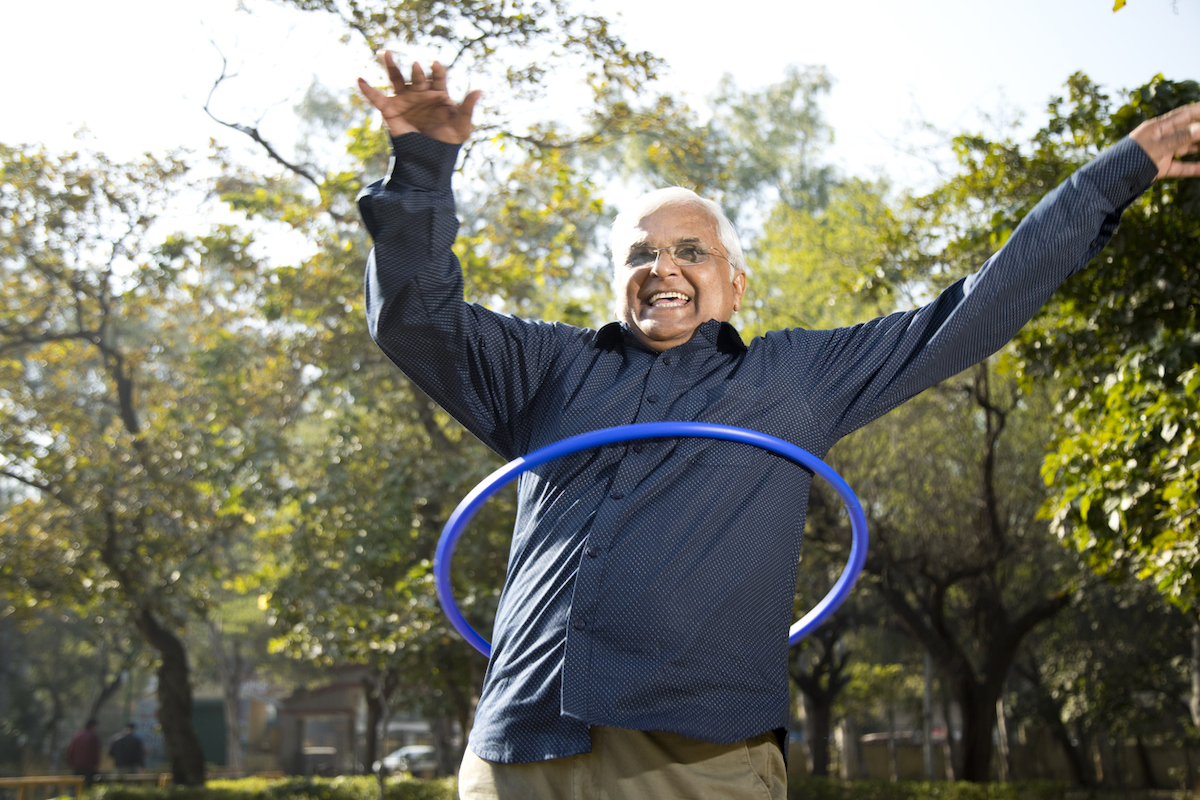People Who Live to 100 Follow These 6 Daily Habits, Research Shows
Here's what centenarians have in common—and how to join the club.

There's no doubt about it: Heredity plays a role in your health and longevity. However, many people overestimate the influence of genetic factors when it comes to how long we live. Far from being a singular determinant of our fates, studies have shown that genetics account for just 25 percent of the variation in human lifespans. The remaining 75 percent comes down to luck, environment, and maintaining good health habits, experts say. Now, research on centenarians is revealing exactly which practices are most common among those who live to 100, giving more people the tools they need to live longer lives free of disease and disability.
Though you can't control everything when it comes to your health, making good daily choices can help sway things in your favor, the research suggests. Even better? They're not hard to do. These are the six daily habits that could help you live to 100 in good health.
RELATED: People Who Live to 100 Eat the "World's Healthiest Breakfast," Researcher Says.
1
They don't stop moving.

As you get older, it's normal to notice changes affecting your bones, muscles, and joints—and all of this can take its toll on your mobility. However, research shows that continuing to get regular physical activity is a key determinant of longevity and that people who live to 100 typically keep moving regardless of their age.
"Physical activity reduces many major mortality risk factors including arterial hypertension, diabetes mellitus type 2, dyslipidemia, coronary heart disease, stroke, and cancer," explains a 2012 meta-analysis published in the Journal of Aging Research.
The analysis, which looked at the results of 13 studies on the relationship between physical activity and mortality, found that the physically active reduced their risk of death from any cause by about 30 to 35 percent compared to inactive subjects. For active subjects, this translated into up to seven additional years of life, the researchers wrote.
Recent studies have added that even small increases in physical activity—for instance, adding an extra walk each day—can have a major effect on health and longevity. The Centers for Disease Control and Prevention (CDC) recommends getting a minimum of 150 minutes of moderate-intensity exercise per week, though doing more will only enhance the benefits.
RELATED: 91-Year-Old Fitness Star Shares Her Best Workout Tips to Stay Young.
2
They stay connected to their communities.

While the average life expectancy in Pakistan is 66 years old, residents of one remote mountain region known as the Hunza Valley reportedly have an average lifespan of 100. Since 2021, travel writer and Connecticut native Samantha Shea has been living in this part of Northern Pakistan and says she's observed several factors that likely contribute to these striking differences.
In particular, she credits the village's rich community ties for residents' better health and longer lives. Ample research corroborates that social connectedness can have a remarkable effect on our lifespans.
"Neighborhoods and villages are tight-knit, and the people of Hunza take care of each other, especially the older members of the community. Retirement homes don't exist here. Elders are highly respected and attended to by their families," Shea wrote for CNBC. "Having lived here for the past two years, I can happily say that I've never had the privilege of experiencing a society as collective as this one."
3
They avoid processed foods.

It's no secret that your diet plays a major role in your health, or that regularly eating processed foods can come with health risks. However, many people don't realize that changing your diet at any age—even incrementally—can make you more likely to live to 100.
A 2017 study published in the New England Journal of Medicine revealed that making dietary improvements, even in mid-life or later, can add over a decade to your lifespan. In fact, that study found that a 20 percent improvement in diet was linked with a 14 percent reduction in all-cause mortality.
To reap the benefits, aim to add more fruits, vegetables, whole grains, healthy fats, and lean proteins while minimizing added salt, sugar, and preservatives.
Shea wrote that this way of eating likely contributes to the good health of people in the Hunza Valley: "People rarely eat processed foods, and you certainly won't find any fast food spots here. Meals are typically prepared fresh in the home daily, and almost every household grows some kind of vegetable."
RELATED: 63-Year-Old Longevity Doctor Reveals 7 Diet and Exercise Secrets to Stay Young.
4
They minimize animal products in their diets.

Studies on Blue Zones—areas in the world that have higher than average numbers of centenarians—also suggest that minimizing your meat intake could help you live to 100. Those who study these longevity hot spots have determined that Blue Zone centenarians eat about two ounces or less of meat about five times per month, and most eat less dairy compared to the general population.
"People in four of the five blue zones consume meat, but they do so sparingly, using it as a celebratory food, a small side, or a way to flavor dishes," Blue Zone experts note. Therefore, their diets are about 95 percent plant-based.
5
They keep their stress levels low.

Keeping a positive attitude and low stress levels also appear to have a protective effect on longevity among people who live to 100.
"Despite the fact that centenarians are prone to chronic stress due to a progressive loss of self-sufficiency, more than a half of our centenarians were not depressed and had a low trait-anxiety: they showed an emotional tendency to react with a low anxiety-intensity to stressful conditions," explains a study in the Archives of Gerontology and Geriatrics. "Their good physical conditions may be explained by a positive character disposition and by strong adaptability to the adversities of life."
RELATED: World's Longest-Living Family Reveals the Lunch They Eat Every Day.
6
They don't smoke.

If you're a smoker who's hoping to live to 100, one of the best things you can do is quit. According to the World Health Organization (WHO), tobacco kills up to 50 percent of users who do not quit.
"Cigarette smoking has been clearly linked to the most common causes of death in the elderly and contributes to the higher death rate and disability rate associated with many chronic illnesses that are common in this age group," explains one study on the smoking habits of centenarians, which found that 83.8 percent of people who live to 100 have never smoked. "The combination of smoking along with other risk factors like hypertension and diabetes increase high frequency disease, and disability as well as adding to an increase in mortality rate."
Among the remaining 17 percent of centenarians, 13.5 percent were identified as former smokers. Only 2.7 percent of people who live to 100 are current smokers, the study found.
Best Life offers the most up-to-date information from top experts, new research, and health agencies, but our content is not meant to be a substitute for professional guidance. If you have health questions or concerns, always consult your healthcare provider directly.
- Source: The heritability of human longevity
- Source: Does Physical Activity Increase Life Expectancy?
- Source: CDC: Benefits of Physical Activity
- Source: CDC: How Does Social Connectedness Affect Health?
- Source: Association of Changes in Diet Quality with Total and Cause-Specific Mortality
- Source: Stress in centenarians
- Source: Smoking and survival in centenarians





















